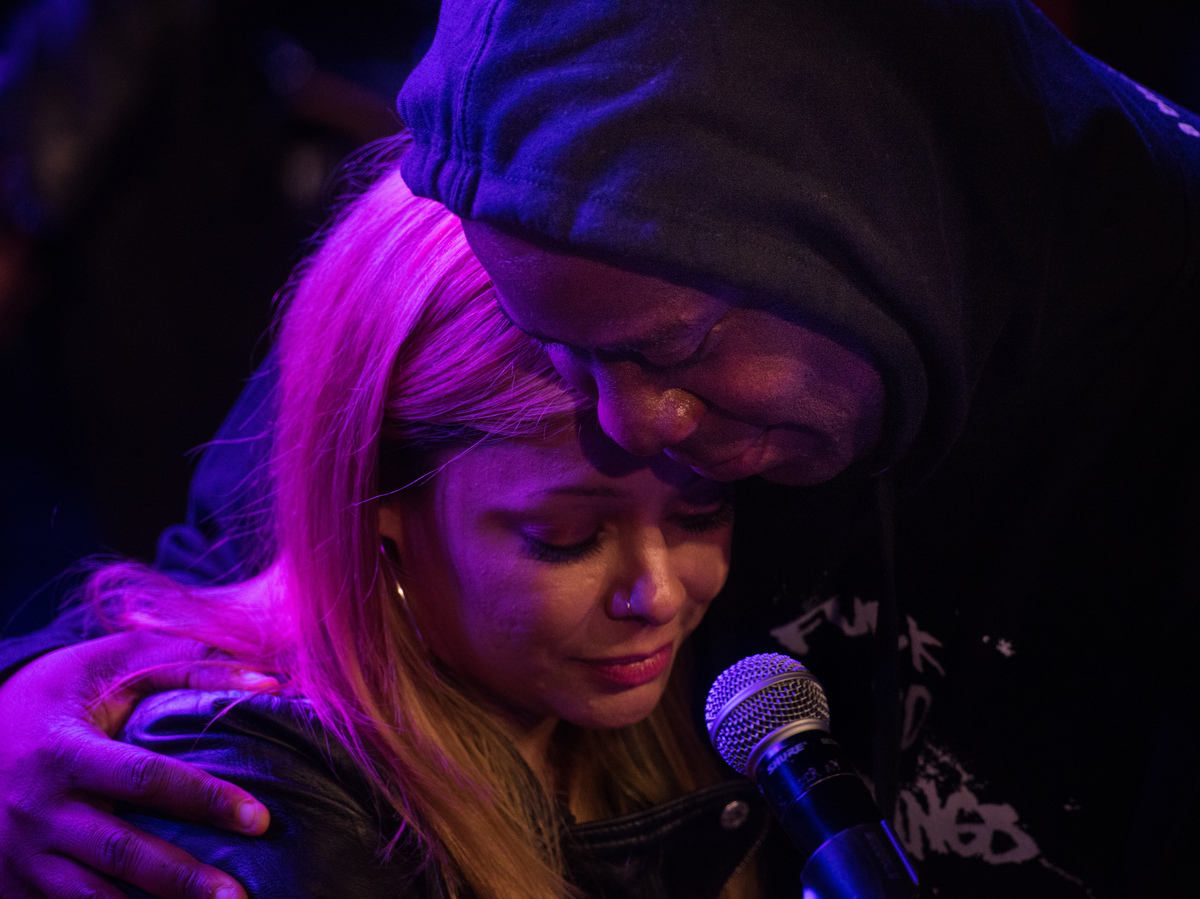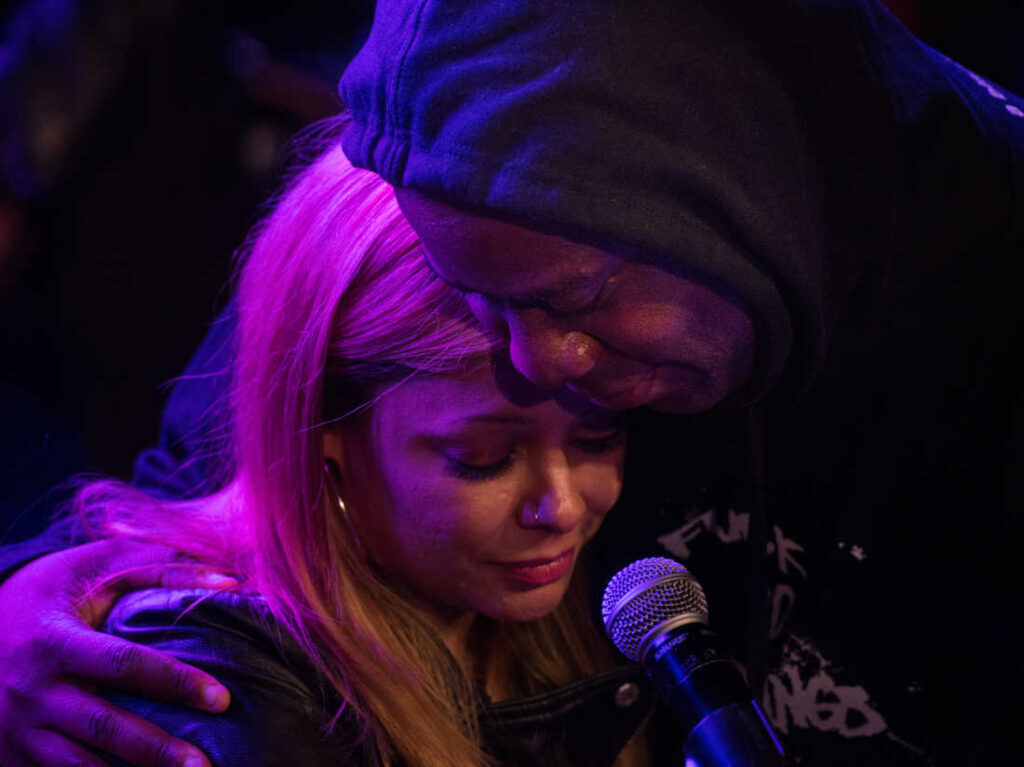Meghan Stabile, photographed onstage with Robert Glasper during Winter Jazzfest 2020.
Jonathan Chimene/WBGO
hide caption
toggle caption
Jonathan Chimene/WBGO

Meghan Stabile, photographed onstage with Robert Glasper during Winter Jazzfest 2020.
Jonathan Chimene/WBGO
Meghan Stabile, a promoter, presenter and producer whose impassioned advocacy helped spark a resurgence of mainstream interest in jazz, particularly among young artists and audiences of color, died on Sunday, June 12 in Valrico, Fla. She was 39.
Bikbaye Inejnema, who served as her counselor over the last three years, tells NPR that the cause was suicide. Inejnema was authorized to speak on behalf of Maureen Stabile, Meghan’s maternal grandmother. “She knows she didn’t meet any of Meghan’s community,” Inejnema says. “But she does want Meghan’s memory to be honored in the way that reflects who she really was, not what she went through.”
For the many musicians and listeners who have expressed shock and sadness since news of Stabile’s death spread this week, the idea of “who she really was” is closely aligned with her incalculable contributions to a scene. As the founder of Revive Music Group, she brought vision and an evangelical dynamism to the promotion of Black American music — organizing shows, making connections and building a constituency. News of her passing first came via an Instagram post by electric bassist, vocalist and producer Thundercat.
Among the other artists aligned with Stabile’s mission were keyboardists Robert Glasper and Ray Angry, harpist Brandee Younger, producer Raydar Ellis, and trumpeters Igmar Thomas and Keyon Harrold.
“Meghan was just as important to the culture as the artists she helped,” bassist Ben Williams, one of her closest friends, attested on social media. Williams added: “She worked so hard to create a world for us young artists to express ourselves. It wasn’t about style or genre. Whether you were a rapper or an avant-garde saxophonist, she made space for us all. She LOVED us. She built a stage when she didn’t see one available for us.”
That enterprising spirit was widely admired in the industry, and not just among collaborators like Brice Rosenbloom, founder of Winter Jazzfest, and Tariq Khan, founder of HighBreedMusic. “Her influence on the reconnection of jazz and contemporary African-American music from hip-hop and beyond has had enormous reverberations on the art form,” Bill Bragin, a veteran music presenter now serving as executive artistic director of The Arts Center at New York University Abu Dhabi, tells NPR. “She worked hard to revive the tradition of the hang, and all the creativity that grows from building a community of artists across generations and styles.”
Small in physical stature, Stabile was known for her indefatigable energy, her solicitous caring for musicians and her willingness to go to bat for the music. John Leland described her as a force in motion in a 2013 profile, “The Making of a Modern Impresario,” for the New York Times: “Ms. Stabile, who stands five feet tall, with a sweep of straightened brown hair pinned and tucked behind one ear, is a woman on a curious mission: to make jazz matter to the hip-hop generation, and to do so as a young woman in a jazz world dominated by older men, at a time when both jazz itself and the recording industry feel decreasingly relevant.”
For a time, Revive Music Group generated not only live shows but also an online publication, The Revivalist, in association with Okayplayer; its roster featured emerging talent like Kyla Marshell and Natalie Weiner. Another outgrowth of the organization is The Revive Big Band, led by Igmar Thomas, now in the process of finishing its debut album.
Jazz Night in America profiled the Revive Big Band in 2015, featuring a concert at the Berklee College of Music. “When people come to the show, it’s not even about either-or; it’s about the music,” Stabile says in the episode. “Bottom line, end of the day, you walk away like, ‘That was a great show.’ You don’t even care if it had anything to do with hip-hop or jazz or whatever. We get so stuck on categories and labels that you completely miss the point of really beautiful, authentic forms of art.”
Meghan Erin Stabile was born July 26, 1982 in Corpus Christi, Texas and grew up in Dover, N.H. She was raised mainly by her grandmother and an aunt, and had no relationship with her father. She was estranged from her mother, Gina Marie Skidds, who died last year. In addition to her grandmother, she is survived by a sister, Caitlin Chaloux, and a brother, Michael Skidds, who have organized a fundraising campaign for her funeral services.
“I got kicked out of four schools — three high schools and a middle school,” Stabile told John Leland. “For fighting. I went through a lot, and I made it through. It didn’t break me. So always having that strength has been able to pull me through any type of situation.”
She attended Berklee, in Boston, as a guitarist and a singer, but soon shifted to music business courses. And some of her most formative experiences took place outside the conservatory, at a local institution called Wally’s Cafe, where jazz musicians held regular sessions. “That was the moment for me that was like, ‘OK, hold on a minute. Why am I just discovering this right now?'” Stabile told Jazz Night in America. She began to wonder “why this music isn’t readily available, or why this music isn’t on the radio, why this band isn’t selling out venues.”
Stabile added a rhetorical: “How did I come to fall in love with this music? I saw it live.”
When she moved to New York in 2006, Stabile brought that conviction with her — hustling to put together shows on a shoestring, while waiting tables in the East Village. She called her fledgling concert series Revive Da Live, building the notion of restoration into its title. Some of the early shows, about a decade ago, featured Glasper, Strickland and multi-instrumentalist Miguel Atwood-Ferguson, along with more established artists like trumpeter Wallace Roney. In short order, Revive Music Group established a foothold on the New York scene and beyond.
Among those who took notice was Don Was, president of Blue Note Records, who partnered with the organization to release an album, REVIVE Music Presents: Supreme Sonacy (Vol. 1), in 2015. “I think Revive has a keen understanding of the basic nature of the music, which is that it’s got to keep moving forward,” Was said in press materials. “Not decade by decade, or year by year, but every day.”
Stabile stepped away from the whirling center of the music scene in recent years, partly to focus on her own wellness. She worked with Rosenbloom to create a spotlight on wellness at the 2020 Winter Jazzfest, presented weeks before the first pandemic lockdown. At a concert titled Revive Yo’ Feelings: A Wellness Benefit for Musicians, headlined by Robert Glasper, Stabile prefaced the performance with a soul-baring reflection on her childhood trauma, her battle with addiction and a history of issues related to mental health.
She also performed in public for the first time in more than a dozen years, singing an untitled song she said she’d written while in rehab. After she’d finished the song, Glasper walked out from the wings to provide a comforting embrace.
“Meghan was my sister,” Glasper tells NPR. “She was the backbone of the modern creative force in NYC which was spreading all over the world! We are going to miss her.”
If you or someone you know may be considering suicide, call the National Suicide Prevention Lifeline at 1-800-273-8255 or text the word ‘home’ to 741741.




